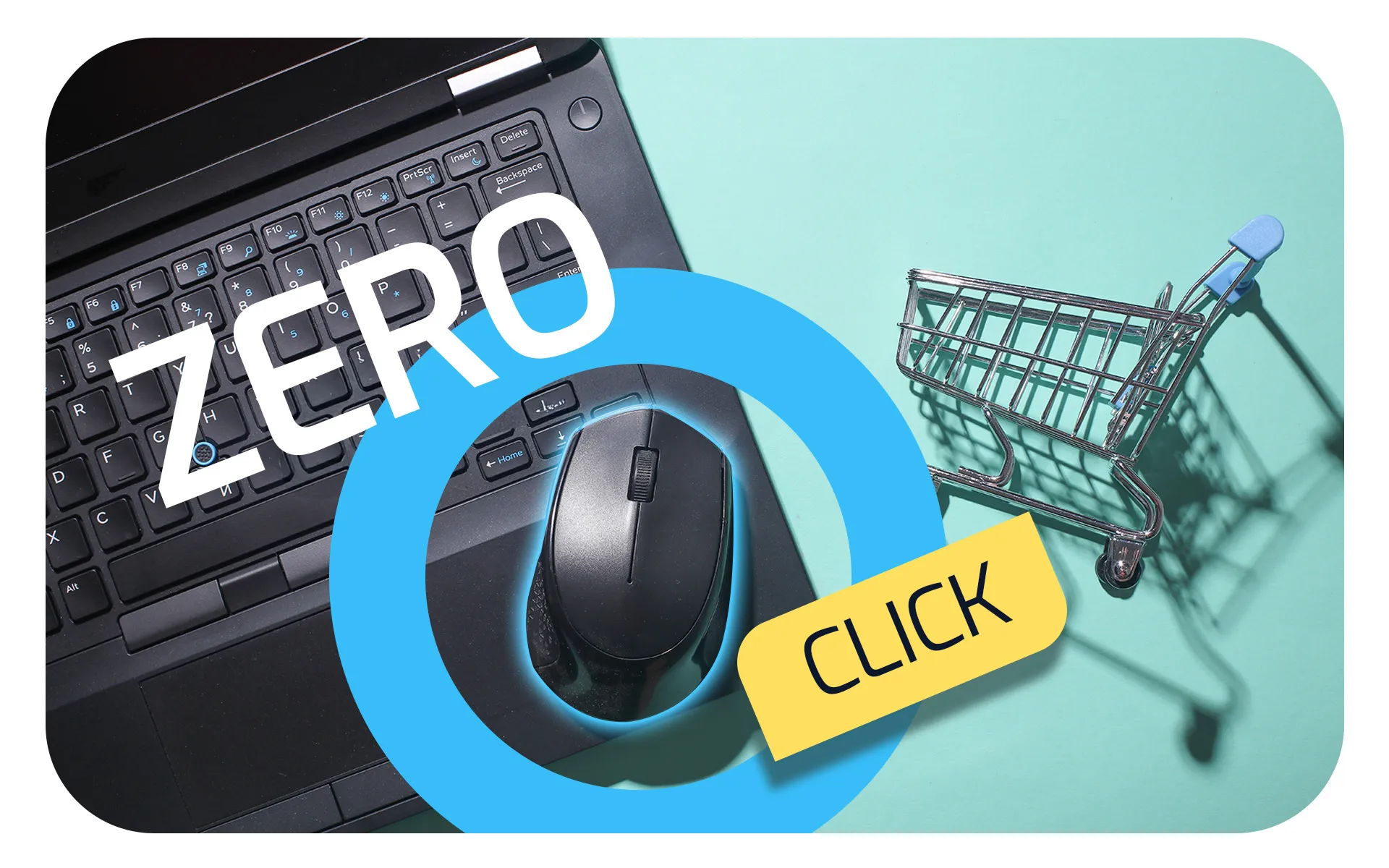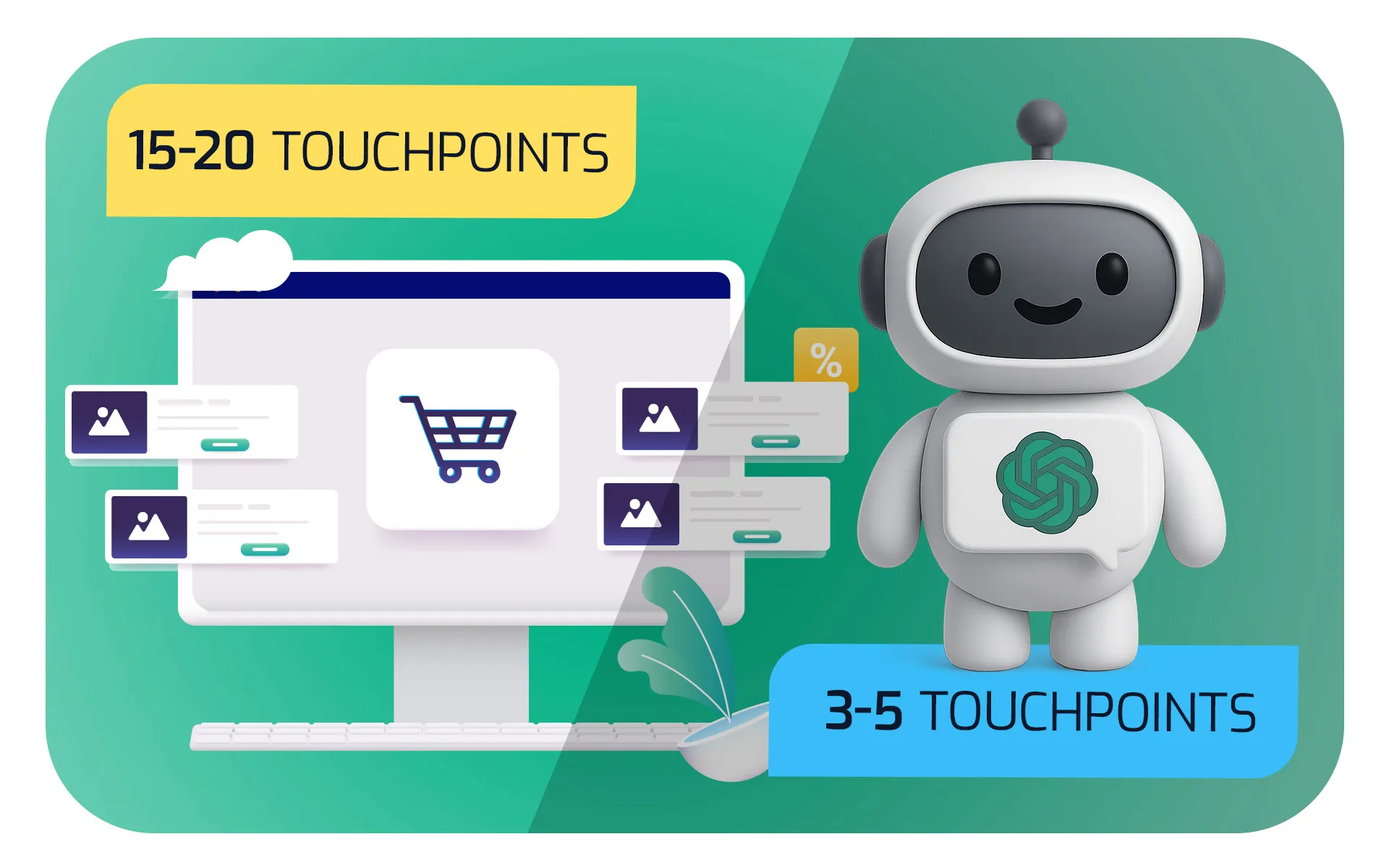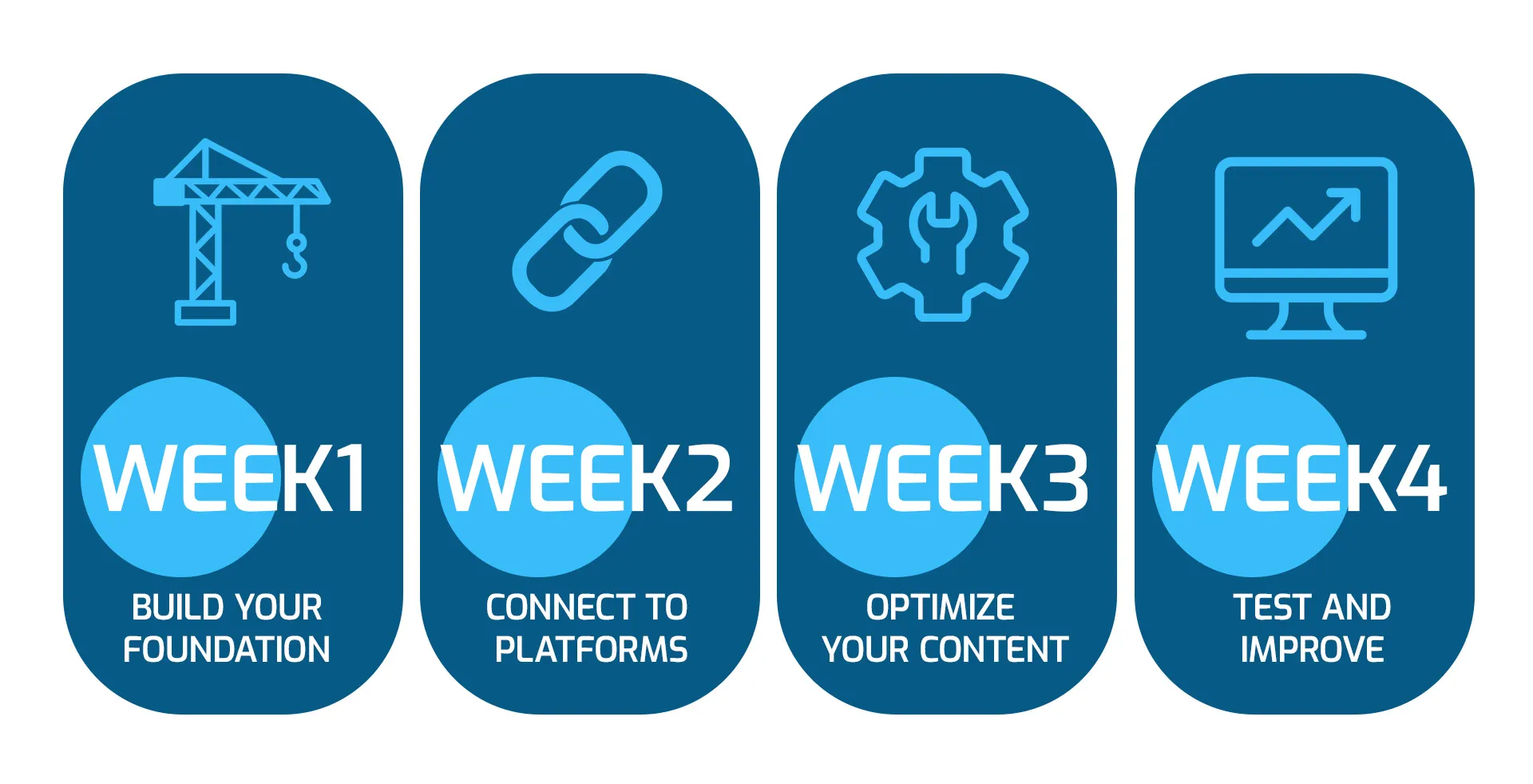read
Something massive is happening in digital commerce, and most business owners are completely missing it. While you've been tweaking your Google ads and posting on social media, a new player has quietly slipped between you and your customers. And it's driving incredible results for the businesses that get it.
Adobe Analytics shows that traffic to retail websites from AI sources jumped 1,200% between July 2024 and February 2025. This isn't just another marketing trend—it's completely changing how your customers find, research, and buy products. AI platforms like ChatGPT are becoming the go-to middleman between businesses and buyers.
Here's the reality: AI has already become the dominant middleman in commerce. The real question is whether your business will thrive in this AI-driven marketplace or get left behind.
The Zero-Click Revolution: Why 80% of Your Customers Skip Your Website

The way customers shop is changing fast. We're seeing the rise of the "zero-click" economy, where AI platforms handle everything from discovery to comparison before customers ever visit your site.
Bain & Company research shows that 80% of consumers use these "zero-click" results for at least 40% of their searches. Translation: most of your potential customers are making buying decisions inside AI platforms before they even think about visiting your website.
How Customers Used to Shop | How They Shop Now |
|---|---|
Search → Browse multiple sites → Compare → Buy | Ask AI → Get recommendations → Buy directly |
15-20 touchpoints | 3-5 touchpoints |
Hours of research | Minutes of conversation |
Multiple tabs open | Single chat interface |
The Customers You Never See
Here's what's really scary: Bain & Company calls these "invisible losses." Companies that don't optimize for AI are losing customers without even knowing it: "They might not even be aware of the loss, as they never hosted the initial website visit or content download to explore the product."
Picture this: Someone asks ChatGPT for product recommendations in your category. The AI suggests three options—yours isn't one of them. That person buys from a competitor, but you never see them in your analytics. From your perspective, this customer doesn't exist.

Quick Reality Check:
Are You Losing Invisible Customers?
Can you track visitors coming from AI platforms?
Do you know when people mention your competitors to AI assistants?
Are you monitoring whether AI recommends your brand?
If you answered "no" to any of these, you're probably losing customers right now without realizing it.
How ChatGPT Decides What to Recommend (And What It Ignores)
Understanding how AI platforms pick winners and losers is crucial for getting your business noticed. When OpenAI launched ChatGPT Shopping, they highlighted key features: "curated product selections with side-by-side comparisons" of features, pros and cons, and customer reviews.
Unlike Google, which just shows you links, AI platforms act like personal shopping assistants. They don't just find products—they evaluate them, compare them, and make specific recommendations based on what each customer needs. Your business isn't just competing for visibility anymore; you're competing for AI endorsement.
ChatGPT includes "real-time images, pricing, and stock availability, all pulled directly from its integration with trusted retailers," making accurate, integrated data essential for success.
Key Point: AI platforms favor businesses that provide complete, accurate, and immediately useful information. If your product data isn't structured for AI consumption, you're invisible to these recommendation engines.
Where Your Customers Are Actually Shopping Through AI
The AI commerce landscape is expanding way beyond ChatGPT, creating multiple opportunities to reach customers in this new ecosystem.

ChatGPT Shopping: The Zero-Commission Goldmine
Here's something huge that most people missed: OpenAI announced that "the company will not receive commissions from purchases made through the ChatGPT platform." This means you can access a growing customer base without paying the typical marketplace fees.
ChatGPT works with platforms including Instacart, Klarna, Shopify, and Shop. If you're on Shopify, you have a direct path to AI-driven sales without extra platform fees.
What You Need for ChatGPT Shopping:
Shopify Connection: Make sure you're properly integrated with Shopify's plugin system
Clean Product Data: Complete, well-written product descriptions with structured information
Live Inventory: Accurate stock levels and pricing that updates in real-time
Customer Reviews: Genuine, detailed feedback for AI evaluation
Mobile-Ready: Smooth experience for people coming from AI platforms
Beyond ChatGPT: The Multi-Platform Reality
Industry experts warn that "Google's Gemini, Meta's LLaMA-powered search in Instagram and startups such as Perplexity are all pushing into this territory, meaning multiple conversational platforms are about to become critical storefronts."
Platform | Status | Shopping Features | Your Opportunity |
|---|---|---|---|
ChatGPT | Live shopping features | Direct purchase integration | High - Get in early |
Google Gemini | Expanding AI results | Ad integration coming | High - Huge user base |
Meta LLaMA | Instagram integration | Social commerce focus | Medium - Specific audiences |
Perplexity | Search-focused | New partnerships forming | Medium - Growing fast |
Your Step-by-Step Guide to AI Visibility
Different businesses need different approaches to AI optimization. Here's your roadmap based on your specific situation.
E-commerce Owners: Your 30-Day Action Plan
Industry experts recommend focusing on "clean URLs, structured data and accessible product descriptions" to make products discoverable.

Week 1: Build Your Foundation
Check Your Current Setup: Review product descriptions for AI readability
Add Structured Data: Include schema markup for products, reviews, and pricing
Write Like People Talk: Rewrite descriptions to match how customers actually speak
Start Tracking: Set up analytics to monitor AI referral traffic
Week 2: Connect to Platforms
Activate Shopify Plugin: Connect to ChatGPT Shopping if you qualify
Sync Your Inventory: Ensure real-time stock and pricing updates
Boost Your Reviews: Encourage detailed customer reviews for AI evaluation
Upgrade Your Images: Use high-quality, descriptive product photos
Week 3: Optimize Your Content
Create Detailed FAQs: Build comprehensive product Q&As
Make Comparison Charts: Develop side-by-side product comparisons
Document Use Cases: Detail specific ways people use your products
Complete Specifications: Ensure accurate, complete product specs
Week 4: Test and Improve
Test AI Queries: See how your products appear in AI recommendations
Check Competitors: Monitor competitor presence in AI results
Track Performance: Monitor AI referral traffic and sales
Keep Optimizing: Refine based on what's working
Marketing Leaders: Your AI-First Strategy
Gartner predicts that "by 2025, organizations that use AI across the marketing function will shift 75% of their staff's operations from production to more strategic activities."
Your Strategic Roadmap:
Phase 1: Foundation (0-3 months)
Audit and optimize your AI platform presence
Train your team on AI-driven customer journeys
Shift budget from traditional search to AI optimization
Phase 2: Integration (3-6 months)
Build cross-platform AI visibility strategy
Create AI-optimized content workflows
Set up performance tracking for AI channels
Phase 3: Innovation (6-12 months)
Map predictive AI customer journeys
Automate AI platform optimization
Develop advanced personalization through AI
How to Reallocate Your Budget:
Traditional SEO: Cut by 30%, focus on AI-friendly content
Paid Search: Keep 70%, test AI platform ads when available
New AI Optimization: Dedicate 20% of total budget to AI platform presence
Analytics and Tools: Increase by 15% for AI tracking capabilities
Strategic Advisors: Industry Disruption Map
The AI revolution follows predictable patterns that help identify which industries face the biggest risks and opportunities.
Industry | Risk Level | AI Opportunity | What to Do |
|---|---|---|---|
Retail/E-commerce | Very High | Very High | Act immediately |
Professional Services | High | Medium | Prepare within 6 months |
Manufacturing B2B | Medium | High | Plan 12-month strategy |
Healthcare | Medium | Medium | Consider regulations first |
Financial Services | High | High | Compliance-first approach |
Disruption Patterns to Watch:
Research-Heavy Industries: Sectors where customers do lots of research before buying are most vulnerable to AI disruption
Similar Products: Industries with commoditized products competing mainly on price see the biggest AI-driven changes
Complex Decisions: B2B sectors with long sales cycles find AI platforms speed up evaluation
Trust-Based Services: Industries requiring high trust see AI recommendations become crucial credibility signals
Tracking What Actually Matters in AI Commerce
The biggest challenge with AI-driven commerce isn't just optimization—it's measurement. Industry experts admit that companies should be "tracking and analyzing traffic from AI platforms, a metric many retailers aren't yet capturing."
Most analytics platforms weren't built for AI referral traffic, creating blind spots in your performance data. But early adopters are building tracking systems that reveal crucial insights about AI-driven customer behavior.
Essential Metrics to Track:
AI Referral Volume: Direct visits from AI platforms
AI Conversion Rates: How many AI visitors actually buy
AI Customer Value: Long-term value of AI-acquired customers
Brand Mention Rate: How often AI platforms recommend you
Competitive Share: Your presence vs. competitors in AI results
Adobe Analytics saw "a 1,300% year-over-year jump in retail site traffic coming from generative AI sources during the holiday season," proving the measurable impact of AI-driven commerce.
Klarna's data showed that "users interacting with ChatGPT made quicker, more confident decisions and had higher conversion rates than traditional app flows," suggesting AI-referred customers might be more valuable than traditional ones.
Future-Proofing Your AI Strategy
The AI commerce revolution is speeding up, and you need strategies that work as the landscape keeps changing.
What's Coming in 2026
Based on current trends and platform announcements, here's what to expect:
Timeline Predictions:
Q2 2025: Google Gemini launches commerce features
Q3 2025: Meta adds shopping to Instagram AI search
Q4 2025: Microsoft Copilot gets e-commerce capabilities
Q1 2026: Apple Intelligence adds commerce integration
Q2 2026: First AI platform advertising models go live
Technologies on the Horizon:
Voice Shopping AI: Integration with smart speakers and voice assistants
Visual AI Shopping: Find products using images
Predictive Commerce: AI platforms that anticipate what you need
Unified AI Profiles: Customer profiles that work across all AI platforms
Building an Unbreakable AI Strategy
Industry experts warn about "the danger of building too much reliance on any single platform and stress the importance of diversifying visibility strategies and owning first-party data wherever possible."
Risk | How to Protect Yourself | Priority Level |
|---|---|---|
Platform Dependency | Be present on multiple AI platforms | High |
Algorithm Changes | Diversify your traffic sources | High |
Data Control | Collect your own customer data | Medium |
Competitive Pressure | Develop unique value propositions | High |
Technology Shifts | Build agile optimization processes | Medium |
Components of an Unbreakable Strategy:
Platform Diversification: Spread your presence across multiple AI platforms
Data Ownership: Maintain direct customer relationships alongside AI presence
Agile Optimization: Quick response capabilities for changes
Competitive Edge: Unique value that AI platforms consistently recognize
Future-Ready Tech: Systems that can integrate with new AI platforms
FAQ
Navigate the AI Shift with Optimum Click
The transition to an AI-driven marketplace is happening now, and navigating it requires a new set of strategies. The core challenges of tracking new customer journeys, managing a diverse platform presence, and future-proofing your advertising strategy require expert guidance. At Optimum Click, we are equipped to help your business thrive in this new era.
We provide the strategic expertise and technical execution needed to turn the challenges of AI commerce into your biggest opportunities.
Measure What Matters with Advanced Analytics: The article highlights that most businesses can't track AI referral traffic, creating critical blind spots. Our Digital Analytics experts can build a custom measurement framework for your business. We’ll help you track visitors from AI platforms, measure their conversion rates, and finally see the "invisible losses" you might be experiencing.
Master a Multi-Platform Advertising Strategy: As AI integrates into search and social platforms, your advertising needs to evolve. We manage campaigns across the most critical channels, ensuring your budget is working effectively today while preparing you for tomorrow.
Google Ads: We can optimize your existing Google Ads campaigns to maintain profitability while building a strategy for the upcoming integration with Gemini's AI search features.
Microsoft Ads: With Microsoft Copilot set to gain e-commerce capabilities, a strong presence on the Microsoft network is essential. We provide expert Microsoft Ads management to position you ahead of the curve.
Paid Social Media: The line between social media and commerce is disappearing. Our Paid Social Media services will prepare your business for new shopping features on platforms like Instagram, driven by Meta's AI.
The AI revolution doesn't have to be a threat. With the right partner, it's a launchpad for growth. Optimum Click can build the agile, data-driven strategy you need to win customers on the platforms of the future.

![AI Advertising in 2025: Real ROI vs Expensive Hype [Guide]](/_ipx/f_webp/img/blog/blog-ai-in-the-advertising-space.jpg)

